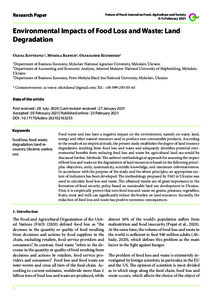| dc.date.accessioned | 2021-03-05T15:14:16Z | |
| dc.date.available | 2021-03-05T15:14:16Z | |
| dc.date.issued | 2021-02-23 | |
| dc.identifier | doi:10.17170/kobra-202102163255 | |
| dc.identifier.uri | http://hdl.handle.net/123456789/12594 | |
| dc.language.iso | eng | eng |
| dc.rights | Namensnennung 4.0 International | |
| dc.rights.uri | http://creativecommons.org/licenses/by/4.0/ | |
| dc.subject | food loss | eng |
| dc.subject | food waste | eng |
| dc.subject | degradation | eng |
| dc.subject | land resources | eng |
| dc.subject | Ukraine | eng |
| dc.subject | useless use | eng |
| dc.subject.ddc | 300 | |
| dc.subject.ddc | 630 | |
| dc.title | Environmental Impacts of Food Loss and Waste: Land Degradation | eng |
| dc.type | Aufsatz | |
| dcterms.abstract | Food waste and loss have a negative impact on the environment through water, land, energy and other natural resources that are used to produce non-consumable products. According to the results of an empirical study, to establish the degree of degradation of land resources as a result of food loss and waste, as well as to identify potential environmental benefits from reducing food loss and waste for agricultural land use. Methods: The authors’ methodological approach for assessing the impact of food loss and waste on the degradation of land resources is based on the following principles: objectives, unity, systemacity, scientific knowledge, and maximum informativeness. In accordance with the purpose of the study and the above principles, there has been developed an appropriate system of indicators. The methodology proposed by FAO in Ukraine is used to calculate the food loss and waste. The obtained results are of great importance in the formation of food security policy on the basis of sustainable land use development in Ukraine. First, it is empirically proven that zero food loss and waste on grains, potatoes, vegetables, fruits, meat and milk can significantly reduce the burden on land resources. Secondly, the reduction of food loss and waste has positive economic consequences. | eng |
| dcterms.accessRights | open access | |
| dcterms.creator | Kotykova, Olena | |
| dcterms.creator | Babych, Mykola | |
| dcterms.creator | Kuzmenko, Olekesandr | |
| dc.subject.swd | Ukraine | ger |
| dc.subject.swd | Lebensmittelabfall | ger |
| dc.subject.swd | Verlust | ger |
| dc.subject.swd | Nahrungsmittel | ger |
| dc.subject.swd | Degradation | ger |
| dc.subject.swd | Ressourcen | ger |
| dc.type.version | publishedVersion | |
| dcterms.source.identifier | EISSN 2197-411X | |
| dcterms.source.issue | No. 1 | |
| dcterms.source.journal | Future of Food: Journal on Food, Agriculture & Society | eng |
| dcterms.source.volume | Vol. 9 | |
| kup.iskup | false | |
| dcterms.source.articlenumber | 361 | |


